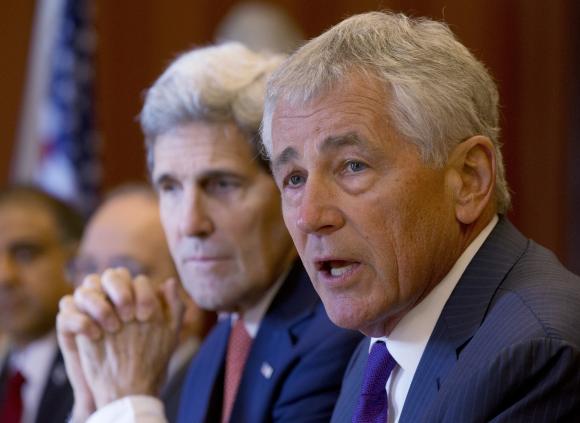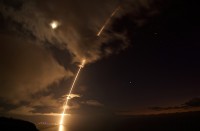SYDNEY

U.S. Secretary of Defense Chuck Hagel (R) speaks alongside U.S. Secretary of State John Kerry (2nd R) at the start of their AUSMIN meeting with Australian Defence Minister David Johnston and Australian Foreign Minister Julie Bishop at Admiralty House in Sydney, August 12, 2014.
Credit: Reuters/Jason Reed
(Reuters) – The United States will bolster its air and navy presence in northern Australia, a source said on Tuesday, under a plan to strengthen defense ties with its regional ally and project more power into the Asia-Pacific, where China’s influence is growing.
U.S. Defense Secretary Chuck Hagel and Secretary of State John Kerry are in Sydney to finalize an agreement reached between U.S. President Barack Obama and Australian Prime Minister Tony Abbott on the deployment of U.S. marines to Australia for joint exercises and training.
Some 1,150 Marines are stationed in Darwin in Australia’s tropical north under a 2011 agreement that launched Obama’s “pivot” to Asia.
The contingent, primed to respond to regional conflicts and humanitarian crises, will swell to 2,500 by 2017.
Officials were also finalizing an agreement to boost U.S. air and naval activity in sparsely populated and resource-rich northern Australia with an increased tempo of visits by U.S. fighter jets and bombers, said a source with direct knowledge of the discussions.
“So more U.S. air force visits to northern Australia, where they can use the fabulous Delamere bombing range and they would probably base out of Tindal,” the source said, referring to an Australian air force base in the Northern Territory.
The U.S.-Australia meetings will include discussions on cooperation in missile defense, cyber security and maritime security, Hagel told reporters at a briefing with Australian counterpart David Johnston on Monday.
Details of the Force Posture Agreement will be released later on Tuesday.
Hagel said the United States was firmly committed to its policy of a strategic rebalance to the Asia-Pacific region, something that has irked China and been questioned by allies who wonder about the extent of U.S. commitment to the region.
China has resisted what it sees as U.S. meddling in the region, particularly in the disputed East and South China Seas, and an attempt to contain its growing military, economic and political influence.
A U.S. proposal for a freeze on provocative acts in the South China Sea got a cool response from China and some Southeast Asian nations at a regional meeting at the weekend, an apparent setback to U.S. efforts to thwart China’s assertive moves.
(Reporting by Lincoln Feast; Editing by Paul Tait)







